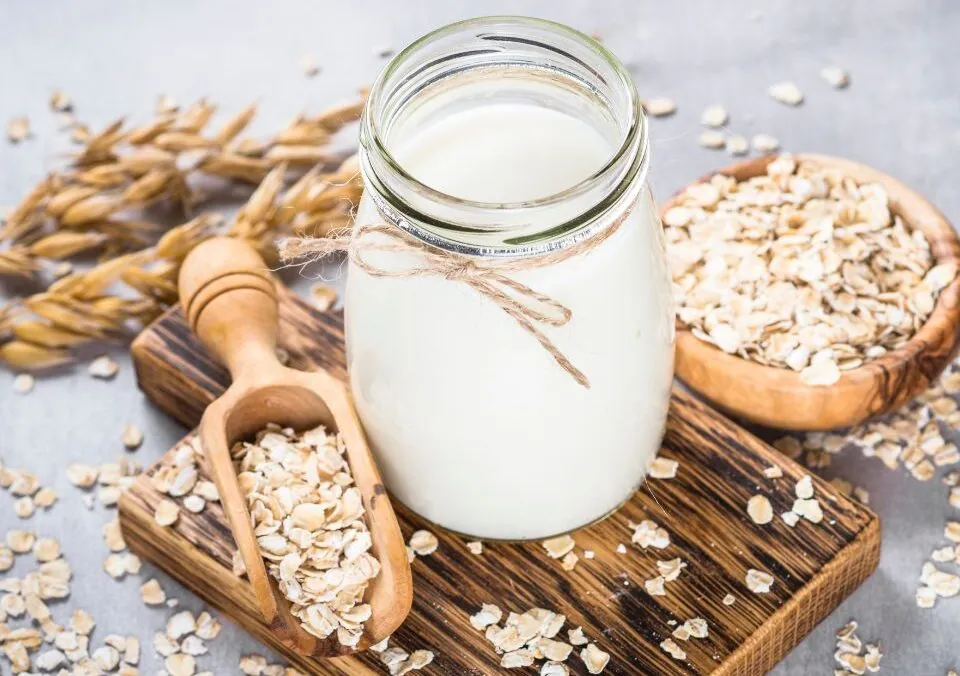Blog
Is Oat Milk Healthier Than Regular Milk?

In the ever-evolving world of dietary choices, the question of whether oat milk is healthier than regular milk has become a popular topic. As someone who writes for Fill Your Plate and works full-time at a local coffee shop, I’ve had a front-row seat to the coffee trends that shape our culinary landscape. Every day, I watch customers craft their ideal coffee experience, some opting for classic combinations while others dive into creative concoctions loaded with various flavors and choices of milk. One trend that stands out is the rising popularity of oat milk, a plant-based, dairy-free alternative that has captured the attention of many.
The Rise of Oat Milk
Oat milk, made from oats and water, has surged in popularity due to its creamy texture and mild flavor, making it an appealing choice for coffee beverages and smoothies. It has emerged as a go-to option for those either following a plant-based diet or those who are lactose intolerant. As we explore the health implications of oat milk compared to regular dairy milk, it’s essential to consider various nutritional aspects.
Nutritional Profile Comparison
One of the first steps in determining whether oat milk is “healthier” than regular milk is to look at their nutritional profiles. Regular cow’s milk is rich in protein and contains essential nutrients like calcium, Vitamin D, riboflavin, and Vitamin B12. According to the U.S. Department of Agriculture (USDA) nutritional database, one cup of whole cow’s milk contains approximately 8 grams of protein, 276 mg of calcium, and 149 calories.
In contrast, oat milk generally offers fewer calories but significantly less protein. Most brands provide approximately 1-2 grams of protein per cup and have a varied nutritional profile depending on whether they’re fortified with vitamins and minerals. Additionally, oat milk is usually higher in carbohydrates, mainly from the natural sugars found in oats. This means that while oat milk can provide a good source of energy, it may not be the best choice if you are looking to increase your protein intake.

Fiber Content
One notable advantage of oat milk is its fiber content. Oat milk is a good source of beta-glucan, a type of soluble fiber that is linked to various health benefits, such as improved heart health and better digestion. According to published research, beta-glucan can help lower cholesterol levels and enhance feelings of fullness, which is beneficial for weight management.
However, the actual fiber content in oat milk can vary significantly between brands and types. Some may contain added fibers for improved texture and health benefits, while others may not. When selecting oat milk, you should check the label to see its fiber content expressed in grams per serving.
Unsaturated Fats and Cholesterol
From a heart-health perspective, one of the significant advantages of oat milk is that it is cholesterol-free. This is particularly important for individuals who are managing their cholesterol levels. Regular cow’s milk contains cholesterol, which is found in animal products. High levels of dietary cholesterol can contribute to cardiovascular issues in susceptible populations.
In contrast, oat milk typically contains unsaturated fats, which are viewed as healthier fat choices. Unsaturated fats can promote good heart health when consumed in moderation. However, some commercially available oat milk varieties may include added oils to provide creaminess, which can impact calorie counts and fats. Hence, it is critical to review ingredient labels carefully.
Sugar Content
Another important aspect to consider is the sugar content in oat milk. While unsweetened versions of oat milk exist, many brands offer sweetened varieties that include additional sugars for flavor. This can quickly raise calorie content and may not be suitable for those monitoring their sugar intake.
For example, a typical serving of sweetened oat milk can contain around 7-10 grams of added sugars, according to nutrition facts from several leading oat milk brands. In comparison, unsweetened almond milk often contains 0 grams of added sugars and is generally lower in calories per serving. Hence, those who gravitate toward oat milk should opt for unsweetened varieties if they are concerned about sugar intake.
| Nutrient | Amount |
|---|---|
| Calories | 120 kcal |
| Protein | 3 g |
| Fat | 5 g |
| Carbohydrates | 16 g |
| Fiber | 2 g |
| Sugars | 7 g |
| Calcium | 25% DV |
| Vitamin D | 20% DV |
| Vitamin B12 | 50% DV |
| Iron | 2% DV |
Lactose Intolerance and Dairy Alternatives
One of the main reasons individuals turn to oat milk is due to lactose intolerance, wherein the body has difficulty digesting lactose, a sugar found in milk. Oat milk, being plant-based and free from lactose, is a great alternative for those affected by this condition. According to Healthline, lactose intolerance can cause symptoms such as bloating, diarrhea, and abdominal pain after consuming dairy products.
In addition to providing relief for lactose intolerance, oat milk is often fortified with calcium and Vitamin D, helping to bridge the gap in essential nutrients typically found in dairy. However, not all oat milk products are fortified, so it’s critical to look for brands that enhance their nutrient profile.
Environmental Considerations
Healthy eating is not only about personal health; many people also consider the environmental impact of their dietary choices. Oat milk is generally viewed as a more sustainable option when compared to cow’s milk. According to a study published in World Resources Institute, producing oat milk requires significantly less water and emits lower greenhouse gases than dairy milk.
The production of dairy involves raising livestock, which not only consumes considerable freshwater resources but also contributes to methane emissions, a potent greenhouse gas. For those focused on eco-friendly living, oat milk can be an attractive option.
Food Sensitivities and Dietary Restrictions
For individuals with food sensitivities, including gluten intolerance, oat milk may be a better option; however, it is essential to choose certified gluten-free oat milk products. Regular milk might not be suitable for those with a dairy allergy or intolerance, making plant-based milks like oat milk a safe alternative.
Moreover, oat milk is generally well-tolerated by most people, as it has a lower allergenic potential compared to soy or nut milks. If you have concerns about specific allergens, always read the labels carefully, as cross-contamination can occur during the manufacturing process.
Cooking and Baking with Oat Milk
Oat milk’s creamy texture makes it a popular choice in various culinary applications. It’s commonly used in coffee, smoothies, and recipes that require milk, such as baked goods, sauces, and soups. While oat milk can be used as a direct milk replacement in most recipes, it’s important to note that the differences in composition can slightly alter the final product. The added sugars in flavored oat milk can affect the sweetness of recipes, so adjustments may be necessary.
When substituting oat milk for regular milk in baking, it typically works well. The natural sweetness and slight nuttiness of oats can enhance flavors in pancakes, cakes, and muffins. Experimenting with oat milk in different recipes can uncover delightful surprises!
Final Thoughts
While oat milk has numerous benefits, including being plant-based, cholesterol-free, and rich in fiber, it is crucial not to overlook its limitations. The lower protein content and potential for added sugars are factors to consider when deciding which milk alternative is right for you. Additionally, it’s important to choose fortified oat milk that aligns with your nutritional needs, especially regarding calcium and vitamin D.
Ultimately, the decision between oat milk and regular milk should be based on individual dietary requirements, preferences, and lifestyles. For those who can consume dairy, regular milk offers a robust profile of nutrients essential for bone health and muscle maintenance. Conversely, oat milk presents a viable alternative for those with dietary restrictions, lactose intolerance, or environmental concerns.
Conclusion
In conclusion, whether oat milk is healthier than regular milk depends on the nutritional context and individual needs. While both have their own advantages and disadvantages, the increasing demand for oat milk demonstrates a shift toward plant-based diets and products. As nutritional awareness continues to grow, consumers should take a holistic approach when choosing their food and drink options, weighing personal health, dietary needs, and environmental implications.
For more health-related articles, check out the Fill Your Plate blog.
By Heide Kennedy, Arizona Farm Bureau Communications Intern

















